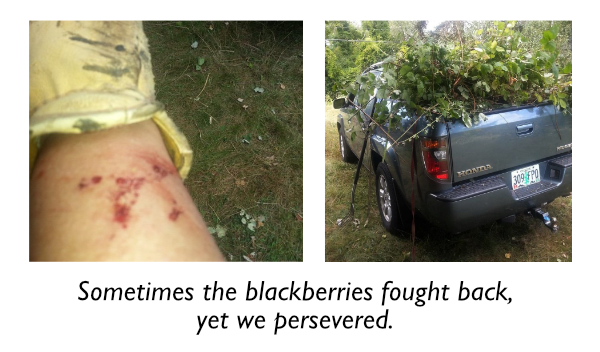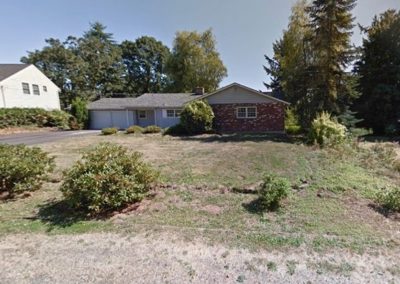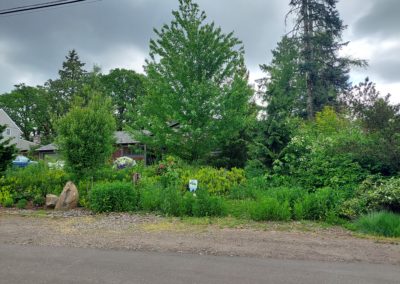Submitted by Mark & Leah Puhlman
We’ve always loved a project. When we moved to the Portland Metro area, our housing search brought us to a bank-owned rancher style home on half an acre in Lake Oswego. As you can see from the pictures, we had our work cut out for us.
We quickly learned that transforming a neglected, blackberry and ivy infested half acre is a marathon, not a sprint. We started slow and are still working toward our vision 11 years later.
When we purchased the property there were some rhododendrons and azaleas, a couple of Douglas fir trees—and we were thrilled to find a flourishing Madrone. And lawn. So much lawn. Most of the three sides of the property was lined with six-foot high, 12-foot wide hedges of Himalayan blackberry hedges.
Together, we set out to transform the property into something that was sustainable, friendly to both insect and animal life, and beautiful. Our goals included:
- Low maintenance
- Areas for outdoor relaxation
- A vegetable garden
- Plants and features that supported pollinators and birds
- Decreased lawn.

Our first task was to rid the property of invasive plant life. The most prevalent species was the Himalayan blackberry but there was also ample English ivy and Creeping buttercup to remove as well. As you can see from the pictures, sometimes the blackberry won and sometimes we won.
Removing most of the blackberries took three years. However, the removal of invasives is never a one-and-done assignment. After eleven years, we’re still pulling out blackberry and ivy found under bushes and in planting areas.
When we retired Leah became a Master Gardener and Mark joined the Lake Oswego Sustainability Network and the Lake Oswego Sustainability Advisory Board. Many of the plants we chose in the first few years were just what was available at local nurseries and big box stores. When we started going for Backyard Habitat certification, we learned so much and found great resources for native plants. We’re still removing our unfortunate choices and replacing them with keystone native plants whenever possible.
Trees are a central element of the garden. Collaborative decision-making regarding tree selection was vital to matrimonial harmony as well as ecologically appropriate decisions. We’ve removed an invasive Norway maple that we planted early on and have replaced a dying, non-native birch tree with a Bigleaf maple – a keystone plant that supports a vast array of pollinators. Up next is removing a Bradford pear, another invasive species, with native Bitter Cherry, Prunus emarginata, another keystone tree.
We continually learn more and as we do, change our decisions and behaviors. The lawn has shrunk to a fraction of its previous size and provides a pathway through the garden and a racecourse for the dogs. We’ve added a large water feature, routed two downspouts into bioswales, and installed a rain garden in the back yard. As we fill in the bare spots with easy care, drought-tolerant natives, the landscape is becoming less work, uses less water, and provides pleasant habitat for humans and creatures alike.
We have gold certification from Lake Oswego’s EcoHome LO program. We have Silver certification from the Backyard Habitat program and should receive platinum status upon recertification. We have a National Wildlife Federation certified habitat garden and are registered in The Home-Grown National Park movement as described in the Douglas Tallamy book “Nature’s Best Hope.” Leah used this book as a guide for her recent Gardening with Wildlife webinar for the Master Gardener program. Every plant purchased these days gets weighed on the scale of the wildlife it will support.
Our “Humble Habitat” garden is a work in progress. We’re learning that each yard can be a powerful tool to protect biodiversity for our rapidly dwindling wildlife. There is no better feeling than to walk out in a yard that is teeming with life, bringing joy to the observer, and restoring a natural balance to our small piece of the world.




